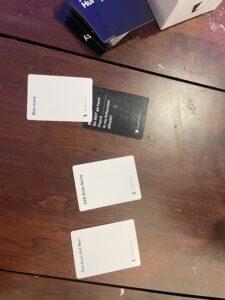This week I played Cards Against Humanity with my project group for this class.
Cards Against Humanity is a social card game designed by Josh Dillon, Daniel Dranove, Eli Halpern, Ben Hatoot, David Munk, Max Temkin, and Elliot Weinstein. This game involves a large group of people (3-20+) and is similar to the game Apples to Apples, as players complete a fill-in-the-blank sentence with a word on their card. The words on these cards are typically offensive and random, designed to make a normal sounding sentence sound humorous and ironic.
The box advertises the game as “a party game for horrible people”. This is because of the game’s offensive humor, so objectively the game is played among those who are 18+. At the start of each game, each player is handed seven word cards and in each round they grab another, so they maintain seven in their hand throughout the game. For each round, there is an alternating leader of the game (switches each round) who chooses a fill-in-the-blank card from the word pile. The leader then reads the sentence to the other players, who then each choose a word from their pile that they think is the best response. The round finishes when the leader collects all the cards and chooses their favorite word for the sentence. The leader then gives the fill-in-the-blank card to the winner and he/she gets to keep the card. The first person to get seven fill-in-the-blank cards wins.
It is interesting to note that while the game’s objective is to pick the “best” card, this definition varies across each group playing. In most cases, as the game advertises, people choose the more silly and random answers. The answers that usually win are the ones that don’t make sense in the context, but rather offensive or politically incorrect. Therefore, this is why this game can only be fun played in a certain crowd.
The mechanics of Cards Against Humanity are very simple and easy to catch on too. The game is easily entertaining, as the ridiculousness and randomness of the cards makes it humorous to everyone playing. However, because of the lack of challenge, I think the game can get boring fast. After a few rounds, the randomness of the sentences and similar offensive humor start to sound the same. Therefore, I think the game could improve by making the card selection process more concise. For example, making different piles to organize the cards by easiest to most challenging for each round, so the game gets progressively more challenging. Another difficulty is some players do not think a certain type of humor is funny, so organizing each pile by type of humor (randomness, politics, sexual, etc) could help the game engage different groups. It is also not a vulnerable game and very surface level, at the end of the game you do not know the other players any more than their sense of humor. While this is not the objection of the game, it could be fun to add vulnerable questions for the fill-in-the-blanks, and for these rounds the players would have to answer them personally.




